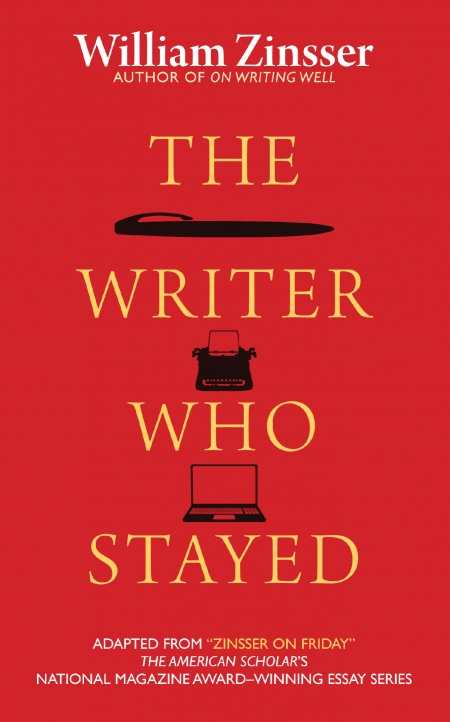The Writer Who Stayed
The idea of the classic newspaperman is fading into the mists of time, as nonfiction becomes, for many purveyors, more about grabbing attention than in-depth writing. Luckily, William Zinsser is still among us; in The Writer Who Stayed, he applies his skills, and the art of the essay, to past and modern eras alike.
This collection of just over a year’s worth of weekly essays was originally published on the American Scholar website. That column, Zinsser on Friday, won the 2012 National Magazine Award for Digital Commentary—just another highlight of a long and storied career as a journalist and writer of nonfiction. Zinsser has written on a multitude of subjects, and The Writer Who Stayed samples all of them as he muses about writing, technology, travel, baseball, and getting older.
Zinsser’s prose is masterful, perhaps more so when he pulls back the curtain to give examples of his favorite essays and explains why they’re effective. His knowledge and experience of several walks of life comes to bear in his pointed essays, delivered with the clever turns of phrase that make his writing so enjoyable. In one essay, he tells of the sheep that once roamed Central Park and whose nighttime shelter was later transformed into “a restaurant called The Tavern on the Green, where a different kind of sheep came to be fed.”
Zinsser shares his memories and opinions of other bygone institutions, including, as he terms it, “The Great American Songbook.” There are elegiac descriptions of libraries and brief biographies of little-known figures from the past. While some younger readers might not be interested in such topics, Zinsser’s writing provides a critical link for them, and especially aspiring writers, in areas of culture and literature that might otherwise be forgotten. He lists travel writers and memoirs that could serve as a “to-read list” for readers interested in those genres, and also writes about his role as a teacher and mentor, “giving permission” to people who think they need approval to be who they want to be. “Nobody gave George Gershwin permission to write ‘Rhapsody in Blue’ at the age of 25,” Zinsser reminds us. “Nobody gave Frank Lloyd Wright permission to design a round museum.”
Summing up The Writer Who Stayed is as simple as its range of topics is complex: glimpses inside the mind of a fine writer with plenty to say. On several occasions, Zinsser proclaims his belief that writers and journalists should do what they do because they enjoy it. This writer obviously still enjoys writing, just as readers will take pleasure in the fruits of his labor.
Reviewed by
Peter Dabbene
Disclosure: This article is not an endorsement, but a review. The publisher of this book provided free copies of the book to have their book reviewed by a professional reviewer. No fee was paid by the publisher for this review. Foreword Reviews only recommends books that we love. Foreword Magazine, Inc. is disclosing this in accordance with the Federal Trade Commission’s 16 CFR, Part 255.


